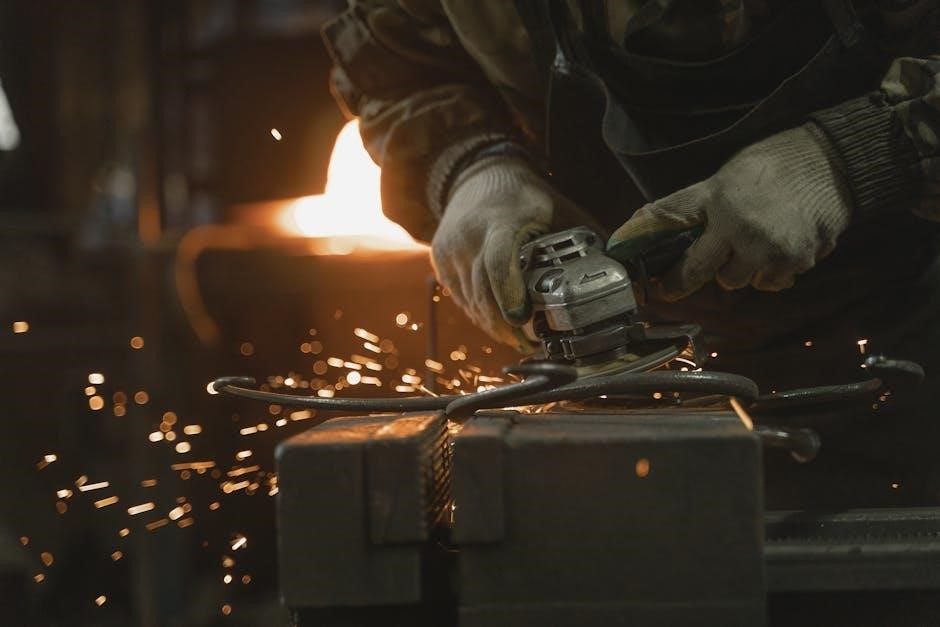
The AC Delco Spark Plug Heat Range Chart is a comprehensive guide for selecting the right spark plugs based on engine type and operating conditions. It provides detailed information on heat ranges, electrode designs, and thermal efficiency to ensure optimal engine performance and prevent damage. Understanding this chart is essential for making informed decisions about spark plug selection.
Overview of AC Delco Spark Plugs
AC Delco spark plugs are renowned for their durability and performance, offering a wide range of options to suit various engine types and driving conditions. They utilize advanced materials like copper, platinum, and iridium to ensure longevity and efficient combustion. With a focus on thermal efficiency, AC Delco plugs are designed to withstand extreme temperatures, reducing the risk of engine damage. Their product line includes options for both everyday vehicles and high-performance engines, making them a trusted choice among drivers and mechanics. The heat range chart provides a detailed guide to selecting the optimal plug for specific applications. AC Delco’s commitment to quality and innovation ensures reliable ignition and enhanced engine performance.
Importance of Heat Range in Spark Plugs
The heat range of a spark plug is critical as it determines how effectively it can disperse heat generated during combustion. A plug with the correct heat range ensures proper ignition and prevents engine damage from overheating or detonation. If the heat range is too low, the plug may overheat, causing premature wear. Conversely, a plug with a heat range that is too high may not ignite the fuel-air mixture efficiently, leading to poor performance and reduced fuel efficiency. Selecting the right heat range is essential for maintaining optimal engine performance and longevity, as outlined in the AC Delco heat range chart.

Understanding the Heat Range Chart
The AC Delco Heat Range Chart helps match spark plugs to engine types and driving conditions, ensuring optimal performance and efficiency through precise heat range selection.
Definition of Heat Range and Its Significance
Heat range refers to a spark plug’s ability to dissipate heat from the firing tip to the cylinder head. A higher heat range means the plug can handle more heat, while a lower range indicates quicker heat dissipation. Proper heat range ensures efficient combustion, prevents overheating, and avoids fouling. Incorrect heat range can lead to engine damage or poor performance, making it crucial to select the right range for specific engine conditions and driving applications.

How to Interpret the AC Delco Heat Range Chart
Interpreting the AC Delco Heat Range Chart involves identifying your engine’s specific requirements and matching them to the appropriate spark plug. Start by determining your engine type and operating conditions. Locate the heat range number on the chart, which corresponds to the plug’s ability to dissipate heat. Higher numbers indicate colder plugs, suitable for high-performance engines, while lower numbers are hotter, ideal for everyday driving. Consider factors like driving habits, engine modifications, and climate to ensure the correct selection. Proper interpretation ensures optimal performance and prevents potential engine damage from incorrect heat range. Always consult the chart or a professional for accuracy.
Key Factors Influencing Heat Range Selection

Several factors influence the selection of the correct heat range for AC Delco spark plugs. Engine type, displacement, and compression ratio are primary considerations. Driving conditions, such as frequent city driving or high-speed highway use, also play a role. Climate and temperature extremes can affect heat dissipation, requiring adjustments. Additionally, engine modifications like turbocharging or supercharging may necessitate a different heat range. Fuel type and ignition system characteristics further impact the choice. Consulting the AC Delco Heat Range Chart ensures alignment with these variables for optimal performance and longevity of both the spark plugs and engine. Proper selection is crucial to avoid overheating or fouling issues.

Design and Construction of AC Delco Spark Plugs
AC Delco spark plugs feature advanced electrode designs and high-quality materials, ensuring durability and optimal performance. Their insulator profiles are engineered for efficient heat dissipation and reliability.
Elecctrode Design and Materials
AC Delco spark plugs feature advanced electrode designs crafted from high-quality materials like copper, platinum, and iridium for exceptional durability and performance. The unique J-type ground electrode ensures consistent spark production and efficient heat dissipation. These materials are chosen for their ability to withstand high temperatures and corrosive environments, ensuring reliable ignition and minimal wear over time. The electrode design plays a critical role in maintaining proper heat range, which is detailed in the AC Delco heat range chart to guide optimal spark plug selection for various engines and driving conditions.
Insulator Profile and Thermal Efficiency

AC Delco spark plugs feature a precision-engineered insulator profile designed to optimize thermal efficiency and heat dissipation. The insulator, typically made of high-strength ceramic, plays a crucial role in maintaining the spark plug’s heat range by controlling how quickly heat is transferred from the electrode to the engine block. A well-designed insulator ensures consistent ignition and prevents overheating or fouling. The thermal efficiency of the insulator directly impacts the spark plug’s performance and longevity, making it a key factor in the heat range chart’s recommendations for various engine applications and driving conditions.
Thermal Efficiency and Performance
Thermal efficiency is crucial for optimal spark plug performance, as it directly impacts combustion and fuel efficiency. Proper heat management ensures reliable ignition and reduces engine strain.

Role of Heat Range in Engine Performance
The heat range of a spark plug plays a critical role in engine performance by regulating the temperature within the combustion chamber. A spark plug’s heat range determines how efficiently it dissipates heat, ensuring proper ignition and preventing overheating or fouling. If the heat range is too low, the plug may overheat, causing engine damage. Conversely, a heat range that is too high can lead to incomplete combustion and reduced efficiency. AC Delco’s heat range chart helps identify the optimal plug for specific engine conditions, ensuring a balance between performance, fuel efficiency, and engine longevity.
Impact of Incorrect Heat Range on Engine
Using a spark plug with an incorrect heat range can significantly impact engine performance and longevity. A plug with a heat range that is too high may cause overheating, leading to damage to the spark plug, cylinder head, or piston. Conversely, a plug with a heat range that is too low may result in fouling, poor fuel efficiency, and incomplete combustion. Incorrect heat range can also cause misfires, reduced power, and increased emissions. Over time, this can lead to costly repairs and shorten the engine’s lifespan, making proper heat range selection crucial for optimal engine function and durability.

Selection Guide for the Right Heat Range
Selecting the right heat range requires matching your engine type and driving conditions to ensure optimal performance, durability, and efficiency, especially with platinum or iridium spark plugs.
Matching Heat Range to Engine Type
Matching the heat range to your engine type is crucial for optimal performance. AC Delco’s chart categorizes plugs by heat ranges from 2 to 7, with 5 being ideal for most engines. A colder plug (lower number) is better for high-performance engines, while a hotter plug (higher number) suits low-performance or older engines. Always refer to the chart to ensure the correct heat range for your specific engine type to avoid issues like overheating or poor fuel efficiency.

Driving Conditions and Heat Range Selection
Driving conditions significantly influence heat range selection. For high-performance or racing engines, colder plugs (e.g., heat range 2-3) are preferred to prevent overheating. City driving or frequent idling may require a slightly warmer plug to burn off deposits. Normal driving conditions typically use heat range 5, as it balances thermal efficiency and longevity. Always consult the AC Delco chart to match your driving habits and engine demands, ensuring optimal performance and preventing damage from incorrect heat range selection.

Installation and Maintenance Best Practices
Proper installation and maintenance are crucial for optimal spark plug performance. Always torque spark plugs to the manufacturer’s specifications to avoid damage. Ensure the spark plug gap matches the engine’s requirements. Regularly inspect and clean or replace spark plugs as needed. Avoid over-tightening, which can damage the threads. Use anti-seize compound if recommended. Proper maintenance ensures reliable engine operation, prevents fouling, and extends plug life. Follow these best practices to maintain peak performance and longevity of your AC Delco spark plugs.
Proper Installation Techniques
Proper installation of AC Delco spark plugs ensures optimal performance and longevity. Always gap spark plugs to the engine’s specifications using a gap gauge. Insert the plug into the spark plug socket and screw it in by hand to avoid cross-threading. Tighten with a ratchet until snug, then torque to the manufacturer’s specifications using a torque wrench. Apply a small amount of anti-seize compound to the threads for easier removal and to prevent seizing. Ensure the spark plug wire is securely connected to avoid misfires. Proper installation prevents damage and ensures reliable engine operation.
Maintenance Tips for Optimal Performance
Regular inspection and maintenance of AC Delco spark plugs ensure optimal performance and longevity. Clean or replace spark plugs as needed to prevent fouling, which can degrade engine efficiency. Always check and maintain the correct gap using a gap gauge to avoid misfires. Inspect spark plug wires for wear or damage and ensure they are securely connected. Avoid overheating by selecting the appropriate heat range for your engine. Replace plugs at the recommended interval to maintain peak performance. Proper maintenance ensures reliable ignition, efficient combustion, and prevents costly engine damage over time.